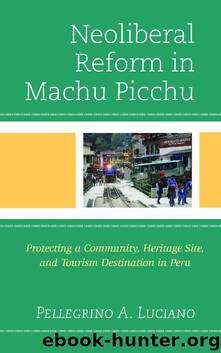Neoliberal Reform in Machu Picchu by Pellegrino A. Luciano

Author:Pellegrino A. Luciano [Luciano, Pellegrino A.]
Language: eng
Format: epub
Tags: undefined
Publisher: Lexington Books
Published: 2017-11-01T07:00:00+00:00
Knowledge is partial and never complete; this is true for ethnographers as well. Many years have passed since my fieldwork, with hindsight to reflect on where the Machupiccheños were effective or not, at least according to their platform of struggle, in their efforts to challenge bureaucracy and the corporate interests of Orient Express. History and past personal experiences are often the most intrinsic sources of knowledge for acting in the world, but under intense social change there are also many impositions in which actors lack experience. The following is a fieldwork excerpt of the conversations from the gathering in Corihuayrachina.
“It’s because people don’t have property titles or rights otherwise these thirty [-three] campesinos wouldn’t have these problems. This is revenge, how ugly,” Regina said. The gathering broke into smaller groups as people turned to their neighbors to chat. It started to rain softly. Walter was concerned. “It’s scary, you know, the landslides.” He was referring to the fierce rainstorm that hit the area the previous day. The conversation moved fluidly from dangerous weather to Sanctuary politics. The weather concerns turned into a discussion on the tragic incident of a family that had drowned a few days earlier. A young couple and their small child were tragically killed when they fell into the swollen Vilcanota River after the hand-drawn cable car (oroya) snapped as they pulled themselves across. “The chain was rusted,” said a man. Walter heard different stories about this incident. He spoke of rumors that the deaths were the result of foul play, allegedly implying Sanctuary authorities. The conversation moved back to the thirty-three campesinos. Oscar got excited, pulling out papers from his folder. One of his talents was a well-developed ability to interrogate law and to point to contradictions in the way it is applied. He waved a document in the air saying, “I have the law right here. Where does it say in the law that one has to [even] ask permission to cut grass?”[1]
The common narrative held by Sanctuary representatives was that the inhabitants of the Sanctuary were not the original inhabitants. To be an “original inhabitant” is a vague qualification, but it reflected the way the law granted permissions. For INRENA and the INC, “original inhabitants” meant families who had continuously lived in the area but could also directly trace their ancestry to the Incas in some sort of unadulterated way; not likely to be found in most current populations of the Andes after five hundred years of conquest and colonialism. They formed part of the racialized narratives that discounted residents as belonging in the landscape, as noted earlier. For the group, an additional problem rested on the interpretation of the laws and the ambiguousness of the definitions. Oscar, who saw a potential in using the law as an avenue for defending residents, expressed frustration over the way institutional actors use various concepts. “Now we have to define [who] is original—what is a Sanctuary? It’s all so arbitrary.” For Oscar, one could hardly lay down any fixed rule around which the authorities were consistent.
Download
This site does not store any files on its server. We only index and link to content provided by other sites. Please contact the content providers to delete copyright contents if any and email us, we'll remove relevant links or contents immediately.
| Africa | Americas |
| Arctic & Antarctica | Asia |
| Australia & Oceania | Europe |
| Middle East | Russia |
| United States | World |
| Ancient Civilizations | Military |
| Historical Study & Educational Resources |
The Conquest of the Incas by John Hemming(622)
History of the Inca Empire by Bernabe Cobo(459)
Unjust Conditions: Women's Work and the Hidden Cost of Cash Transfer Programs by Tara Patricia Cookson(376)
The Black Doctors of Colonial Lima by José R. Jouve Martín(360)
Neoliberal Reform in Machu Picchu by Pellegrino A. Luciano(328)
